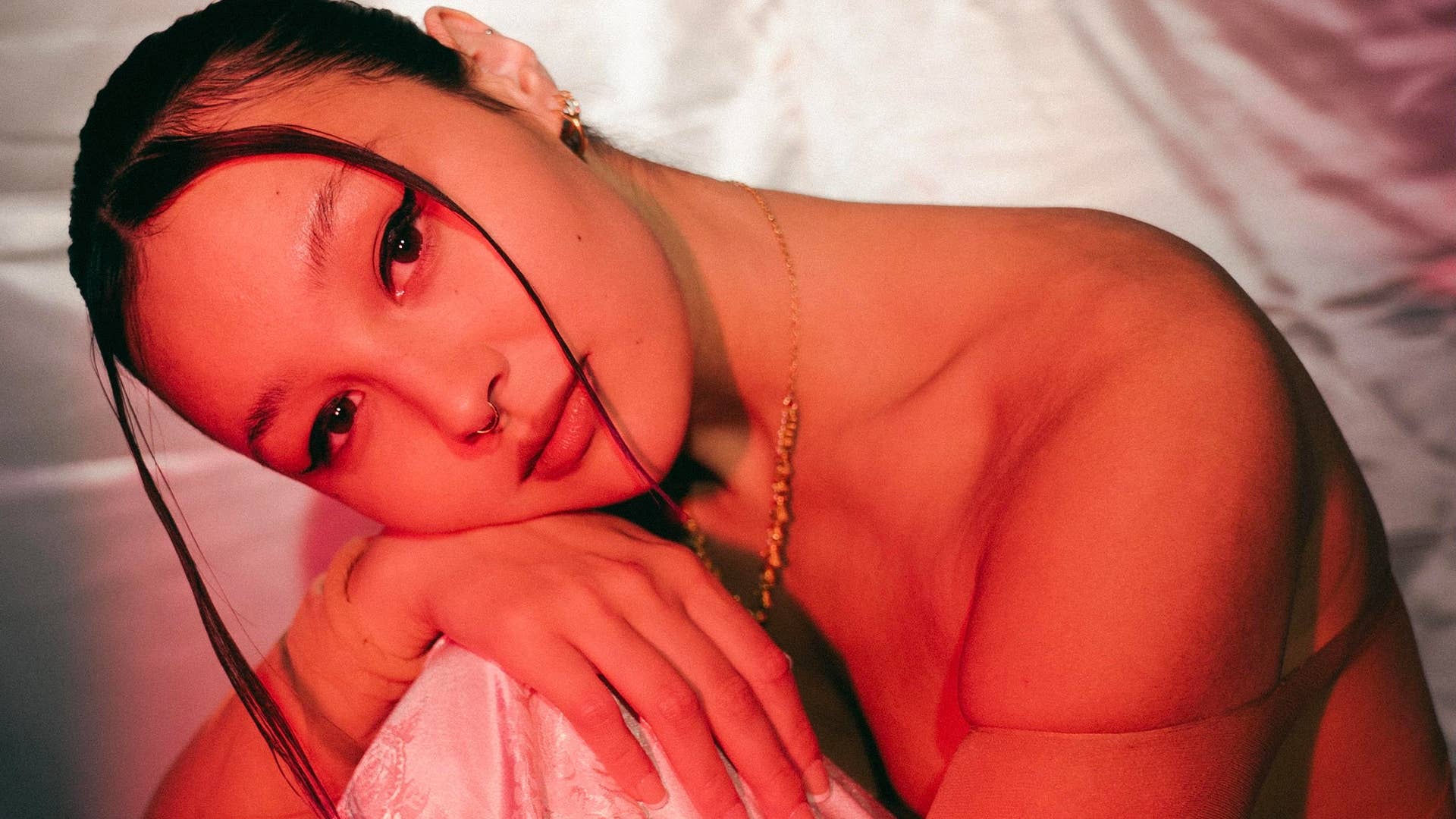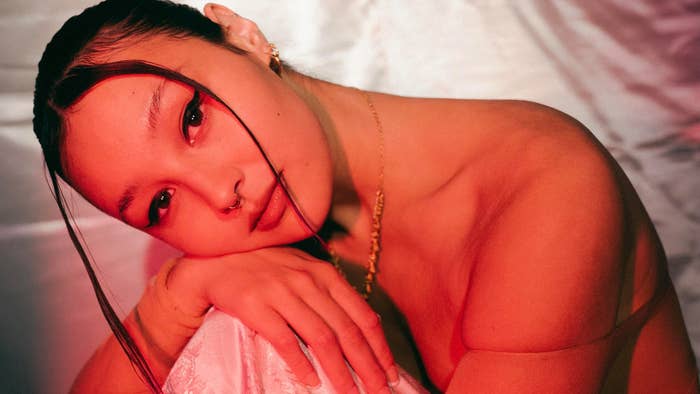
Luni Li does not wish to be perceived.
It’s a surprising statement from a musician who is probably best known for her 2021 jams EP, which came to life after a series of short jam session videos blew up on her Instagram. In each clip, you can see Li in full force, doing what she does best by grooving along while playing her array of instruments (the violin, harp, piano, and guitar all make appearances) for the whole world to see. And although she’d been making music for several years, the jams eventually became the EP that solidified her ethereal sound and set her up as a cosmic talent to watch.
In many ways, the stage name Luna Li (Li’s real name is Hannah Bussiere Kim) is a way for her to not be perceived, by offering a form of escapism—armed with her classical training, she can disappear into her musical universe Luni Li, filled with electrifying guitar riffs and dreamy harp plucking. And with the release of her debut album, Duality, she’s flexing her skills as a singer, songwriter, producer, and multi-instrumentalist to boot.
When we hop on a call over Zoom, the Toronto music polymath is in sunny L.A. and wearing a top mixed with red and black—an interesting and decidedly bold choice for someone who makes the perfect relaxing tunes to listen to alone, and who thrives when cooking up music all by herself. Yet, it’s one that makes perfect sense after listening to Duality, which perfectly encompasses Li’s sincere, honest lyricism with her sunny yet serene disposition. It’s a balance of being lush and colourful, while also diving into feelings that simmer just beneath the surface. Duality and its multifaceted songs are the perfect entry point into the kaleidoscopic world of Luna Li.
We chatted with Li to hear about the process behind her debut album, her takeaways from touring with Japanese Breakfast, and writing songs that uplift women. The interview, slightly edited for clarity, is below.
Hi! How’s it going?
I’m good, how are you?
Oh my gosh, I’m not too bad. It’s so nice to finally see you and everything!
I know!
This is so cool.
Where are you at right now?
I’m in Toronto. I’m downtown.
That’s awesome. It looks sunny!
It’s so sunny. It’s so cold outside right now but the sun is giving me life. And you’re in L.A. right now?
So warm, it’s so nice!
I’m so jealous. Oh my God, I was like creeping on Instagram, and I was like, “Oh my God, she’s at the beach with Hope Tala, living her best life.”
[Laughs.] It was so nice.
Also, I love your top, by the way. That’s so cute.
Thank you. I bought it at like this market in L.A. here. It was so fun. Oh my God, [there were] so many vintage booths and jewelry, it was really sweet.
I love that. I’m obsessed with going drifting and trying to find really cool vintage stuff.
I know, there’s so much about the markets here. I didn’t expect it.
So first thing’s first, obviously, now that the album is done, how do you feel?
I am very happy. It’s been a long process. I started writing this album four years ago, which is crazy. I can’t believe it’s been four years, but yeah, it’s done. It’s coming out. I am very excited, also very nervous, but I have lots of good feelings about it.
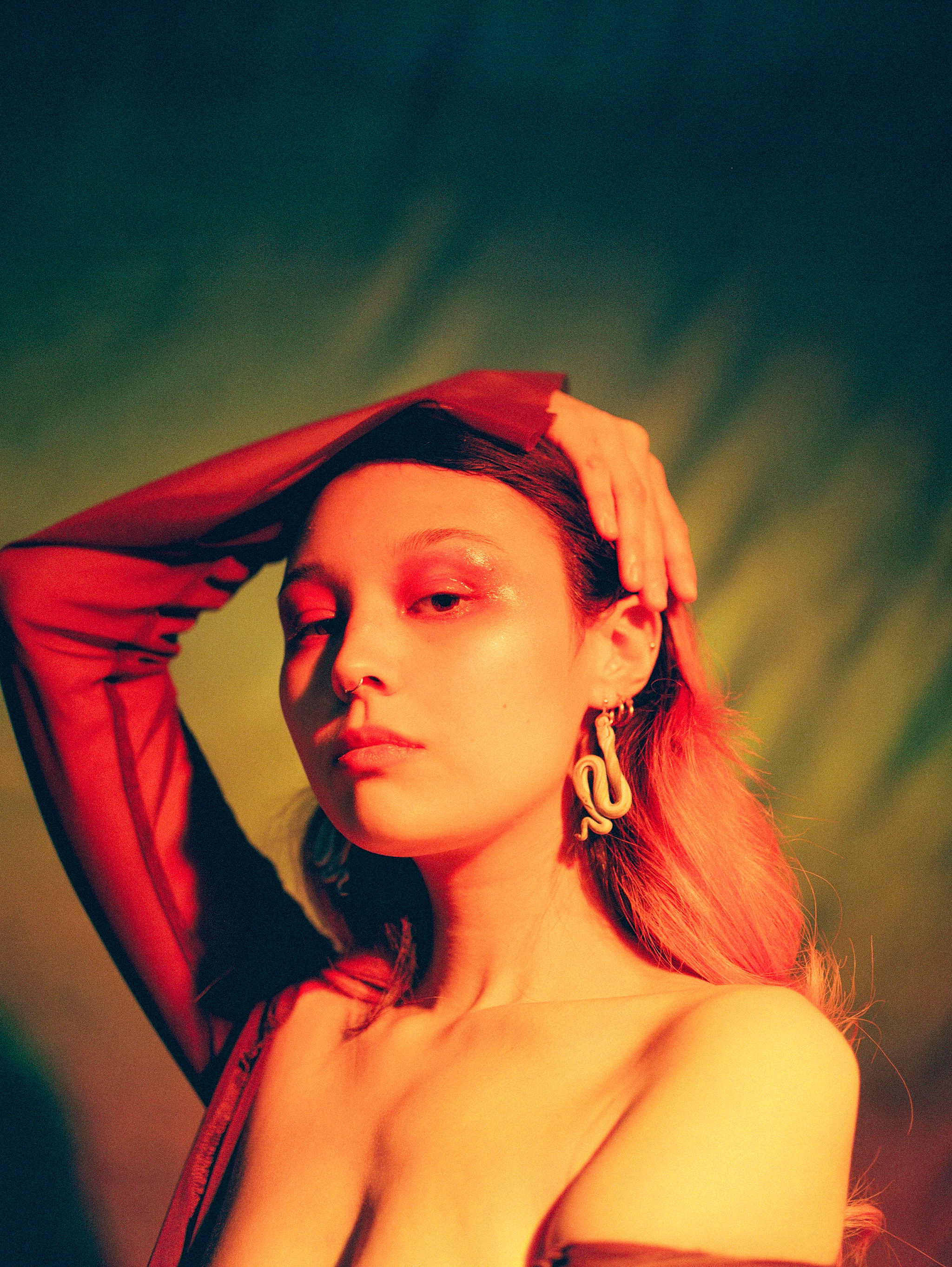
Well, you said that it’s been a long time coming and I feel like, I mean, me being a fan, we’ve had the chance to watch you go from your EPs to actually putting out a real album. So I mean, that’s crazy.
Yeah, it’s great. Thank you so much for following the journey.
I love it. I’ve got to support the local Toronto talent. So, I guess just sort of touching on that a little bit, you’ve had several EPs, [and] like you said, [an album’s] been a long time coming. How do you think the album expands on them? How do you think you’ve grown in that time since you first started putting out music to actually having an album come out?
Yeah, I mean, I think I’ve just been growing into myself and growing into my sound and like really learning how to balance like my classical background with exploring new sounds [from] pop and rock and even R&B a little bit now and just, melding all these influences together and making it my own. So, yeah, it’s been a long journey. It’s been a lot of ups and downs, but I think it’s really developed into a cool sound.
Yeah, definitely. I mean, I was going to say there are obviously a mishmash of different sounds on the album, you have more dream-pop kinds of songs and you’ve got some that are a little bit more on the rock side of things, which is super cool. So what were some of the influences that inspired you during this time? And what really sort of got you going ‘I need to make something like this.’
Some of my influences while I was making this album were Kevin Parker/Tame Impala—I was always such a huge fan. I bought my first guitar because of him. He has the Damascus Jazz Master, which is like the one that I played all my shows now and, kind of in a similar vein, Melody’s Echo Chamber. She is also a violinist and she produces a lot of her stuff, which really inspires me. Mild High Club, I was obsessed with the album Skiptracing, [I] love the jazz kind of influence, and I got really into that. And then also Moses Sumney, he’s such an amazing vocalist—I’m obsessed. I am really inspired by the way he layers vocals and just the way he put songs together is really cool. And Solange, I love her. I love her work and her vocal layering and use of kind of like, almost choral stuff, is really cool.
All great. Love all of them.
Of course, my classical background is kind of melded in there as well.
Yeah, I was actually super curious about that too, because how do you think that sort of helped you while you were working on this? And was there anything that [made] you sort of step back, and take a moment, and maybe unlearn some of that training that you’ve had?
People ask me about that. I’m so happy that I have the musical training. Like, I worked really hard as a kid on classical violin and classical piano and worked on the technique and spent hours practising. And I just feel so grateful to have that behind me and be able to use all of that stuff that I learned in what I’m doing now. And even though it’s different, it’s still so applicable.
And I also love having this background because I love being able to just have a deeper knowledge and understanding of what’s going on when they arrange stuff. It’s helpful when I’m figuring out harmonies and parts and all that, so I’m really glad I have it. I think since I’m not so much in the classical theory world anymore and I’m not like studying at all, I still have the ability to sort of remove that for a bit and just use my ear—my instinct is with my ears. So I think I’m still able to kind of step away from that, which can be very useful at times.
I feel like having that balance is almost like a secret weapon, because—I used to play piano for years and I hated theory and I was so bad at it, probably even more so now because I’m extremely rusty—the ear I feel like is such a good thing to have, especially when you play.
What sort of piano did you play?
Well, I don’t play anymore, but I did. I started when I was in kindergarten and then I did it up until like high school. And then I was like, I have to get a part-time job. I need money.
Did you do RCM?
No, I’m trying to remember what I did, I think CC? I’m trying to remember. I used to play for my [grandma].
That’s awesome.
So obviously you did a lot of the arranging and writing and stuff, so what was the process like when it actually came to recording it? Did you do that yourself?
So with all of the songs on the album, I had demos for them and I fleshed them out as much as I could on my own, creating the arrangements, recording stuff on my own in my room, and then I brought it to my producer, Braden, who has a studio in Toronto called Marquee Sound, and we re-recorded everything there, did studio versions of them. He helped me, I guess, just enhance all the songs, bring [them] to the next level. And we played everything together in the studio. He played the drums and the bass, and then I played everything else. And it was a long process because it was only the two of us. But it was really fun.
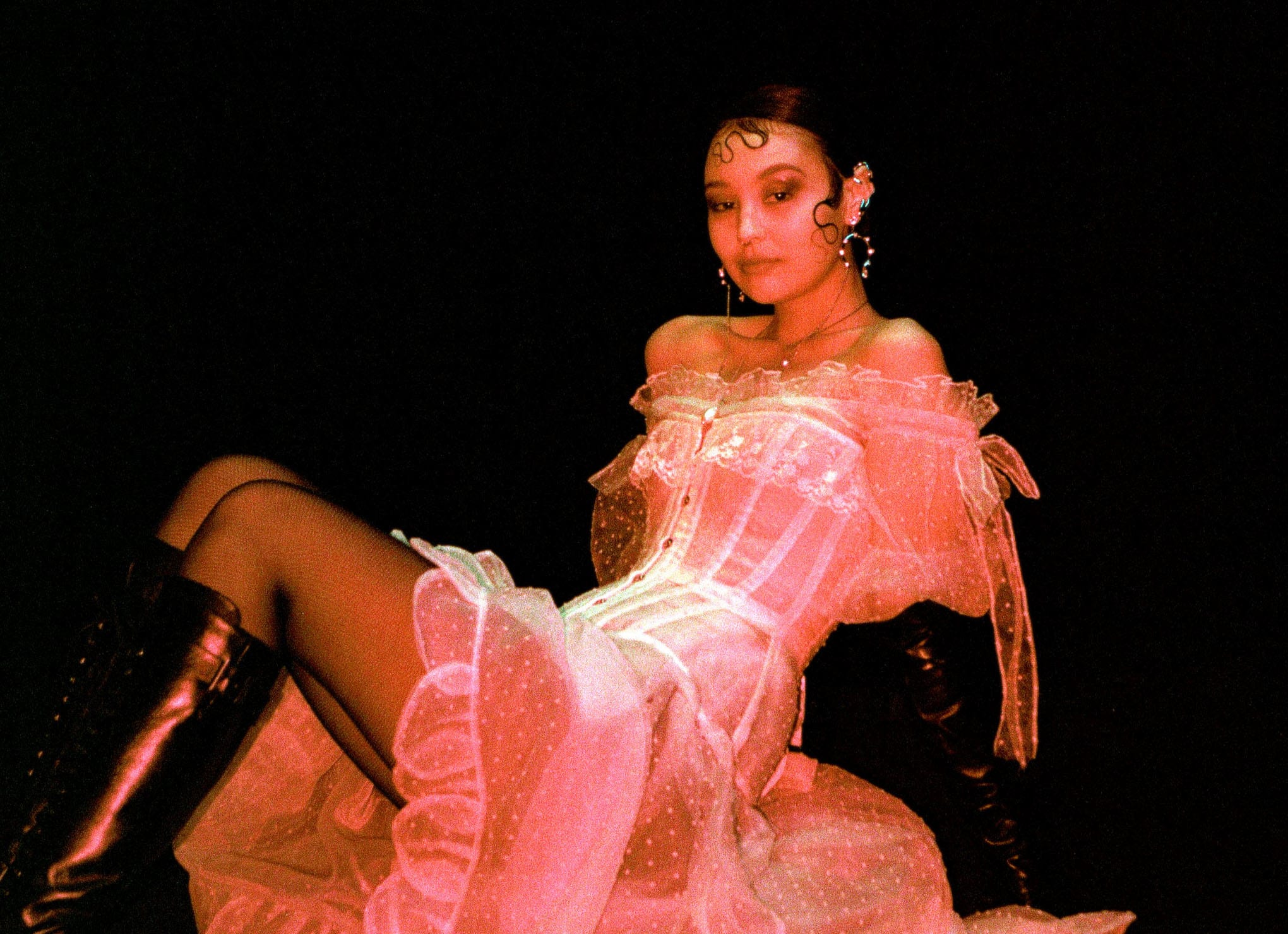
I didn’t realize, because I didn’t know if you did it all yourself or you actually had the whole team or anything. And then because [you were] working with a different person, how was that different than doing your jams? Because [with] your jams, I feel like everyone’s used to just seeing you, just hearing you. So how do you feel that sort of evolved from there?
Well, I started making the album before the jams even happened, which is funny because now I am used to the opposite order. But when the pandemic hit, I just started making those jams because I wanted a way to keep connecting with people and sharing my music with people, even though I was stuck inside. And I had already made a couple of guitar solo videos, and I noticed that people really liked them. And then I just started making more of those videos because I was like, “Oh, I have two weeks off, let’s go, let’s make some music.” And of course, it was much more than two weeks off.
But yeah, it was the pandemic bringing everything to a halt. I was teaching at my moms’ music school at the time and my job took a break, and I had all this free time ahead of me and I decided to just plunge full force into making these jams. And it was the first time I really had to make stuff by myself because I didn’t have anyone with me. I didn’t have Braden in the studio or my band to play with me live or anything like that, so I had to just record and write everything and play everything myself and film it myself. It was really fun. It was a really great exercise in production, and I learned a lot about how to produce and how to arrange and how to put a song together. And so, yeah, that was a really great learning experience, and it was also very special because it was the first time that I really was the only person who touched a project from start to finish.
Yeah, no, definitely. That’s kind of like your firstborn in a way, and then this is your other kid. The name of the record is Duality, So tell me a bit about that theme appearing throughout the album and how you came back to it when you were crafting the songs for it.
Yeah, I mean, I always struggle with titles and it’s always the thing that comes last for me. And I had finished all the songs on the album and I didn’t know what to call the album. And I had this big brainstorming session and I had also been talking with Braden in the studio, and he kind of noticed this theme in my music where it was never just one thing. There was always like, if it was a happy song, there would always be some element of uncertainty or anxiety, or if it was a happy-sounding melody, there would be sad lyrics. So it was always like a little bit of both. And he kind of noticed that in my writing, and that was something that I wanted to try to, I guess, put into a title. And yeah, so the word duality came up and it felt very fitting because it was difficult to try and find one theme that really connected all the songs together because I had written them over a span of several years. But it just fit and it clicked.
And then I started thinking about it more and realized it really fit into my identity, as well as someone who’s half Korean [and] half Canadian, having to balance those two aspects of myself. And then, [balancing] my classical background with my more rock/pop/R&B side and figuring out how to do that because I had really tipped the scales. And in every way at different points of my life and kind of creating this record, I was like, “How do I bring those two things together?” And so, yeah, it just felt like it was suddenly fitting into all these different aspects of my life. And I was like, “That’s the title.”
I feel like that works so well, it’s definitely cool because you got to have that mix in your personal life and also in the music and have it sort of amalgamate into this one thing.
Yeah, I think everyone can relate to the idea of balance in any way as well, so it was something that felt relatable. And every time now I’m having a conversation with people about the album, there’s always some point where we’re talking about something and it’s like, oh, that’s duality!
“I came at my work and my art and everything I do with a lot of intention in terms of working with other women and women of colour and uplifting other women.”
It literally can be duality of woman—the duality of being a woman of colour in Canada. And so also on your album, you have songs with beabadoobee and Jay Som, so tell me about how those collabs came to be. I was thinking about this actually when I was listening to it, you guys are all young, you’re all women or non-binary people of colour. In many ways, you’re kind of reshaping or redefining what indie music really looks like and the changing face of that. So tell me a little bit about what it was like working with them and how it all just came together.
It was amazing, it was a couple of years into the process of making the album and my label came in. I started working with the label and they had this idea of adding features. And it was really exciting to me because I had these songs that felt very stagnant and I had already been sitting on them for a couple of years at that time, and I was like, “Let’s bring so people to breathe new life into these, it’s going to be really exciting.”
And one of my main goals and working as Luna Li and starting my project was to uplift and work with other women, especially women of colour. And so immediately I was like, I really want to have Asian women on this record. And that’s kind of where, like, I just had a big brainstorming session and that’s where the names beabadoobee and Jay Som came up and I just cold DM’d them on Instagram and I was like, “Hey, I have these songs.” I think we already followed each other, we’re sort of internet friends. But then I was like, “Yeah, so I’m making an album, and I’d be honoured if you would be on it.” And I really wasn’t expecting them to say yes. It was kind of a longshot, but they both were down, which is so cool.
And then, yeah, so I just kind of sent them the stuff and they added their parts on their own and when they sent it back to me I was so happy. They just killed it. They just meshed so perfectly and they really like the songs. And then Serena [Isioma] goes by Dreamer now, Dreamer Isioma. I knew them through my label and my label connected us because they thought we would get along. And we had noticed that Dreamer was like using some of my songs on their Instagram stories and stuff. So, yeah, and then I listened to some of their work and I was like, “This is so cool and it’s really inspiring, and they’re just such a cool person.” And I sent them the song “Flower” that I have expanded from the jam and I was like, “Would you want to try a verse?” And yeah, I feel like what they added was really cool and added a whole new dimension to the song into the album as well.
I almost feel [with] your sound, you can hear little bits of it and some of their stuff and vice versa. It very much does flow really well. So it’s like they all added a little sprinkle of something.
I love it so much, it makes me so happy.
“I’m completely free to try whatever I want to try and do whatever I want to do without worrying about anyone judging me or, you know, even just perceiving me—I don’t want to be perceived.”
And then so I was reading through the press release that your team sent over about the album, and it said that when it came to writing the songs, you were crafting them from the perspective of the female gaze. So I guess just touching on why that’s important to you and how you feel that that’s going to translate when listeners and fans get to finally hear it.
Yeah, I mean, representation has always been really important to me. And especially, it’s something that I think about with a lot of intent for this project. And so just having grown up in the Toronto rock scene, I just didn’t see a whole lot of women on stage or especially Asian women. I never saw Asian women performing. And so I guess like I thought about that a lot and wanted to make sure that I came at my work and my art and everything I do with a lot of intention in terms of working with other women and women of colour and uplifting other women. And so, yeah, when I crafted all the visuals for this album. I really wanted to make sure that it was women who were really taking the lead on those because I just feel like, you know, coming from my perspective, even if I’m not writing about it inherently, I’m coming from the perspective of an Asian woman. So that’s where everything I do comes from. And so I feel like other women can, like, understand my art in a really special way. And so that’s why I wanted to [work] with other women in terms of the visuals, but also in terms of the features.
“I struggle with, you know, the idea of loneliness and life and trying not to feel isolated or alone. And in those moments, I remind myself that it’s actually can be really, really special. So that comes out a lot when I’m writing.”
Your [release] kind of also mentioned that [the album] is something you can dance around in your room to and it can be like a safe space of belonging for people who feel like [they] don’t fit in. And for me, listening to it, I very much got that vibe from “Alone But Not Lonely.” It’s almost like an introverted anthem; it feels very much like when you sort of need to be alone and appreciate yourself as you are. So talk to me a little bit about those themes on the album as well.
When I create, I feel like there’s just such a magic about being alone and creating something. And my favourite space to create in is when I’m completely by myself and no one else. I know that no one else can hear me, I can see me. So it’s just like I’m completely free to try whatever I want to try and do whatever I want to do without worrying about anyone judging me or, you know, even just perceiving me—I don’t want to be perceived!
That’s the most Gen Z thing ever, but honestly… don’t look at me!
[Laughs.] A lot of the time when I’m writing lyrics I’m in the zone. So that theme comes up a lot because I’m feeling so inspired and magical, just being alone by myself. And I think as most people do, I struggle with, you know, the idea of loneliness and life and trying not to feel isolated or alone. And in those moments, I remind myself that it’s actually can be really, really special. So that comes out a lot when I’m writing.
That’s so good. I feel like it’s a very powerful thing to do because, at least with me, when I listen to an album right off the bat, it’s something you just do by yourself—I listened to this album alone. So I feel like if someone’s in their room alone, relaxing, listening to it, they’re really going to pick up on that energy.
Yeah.
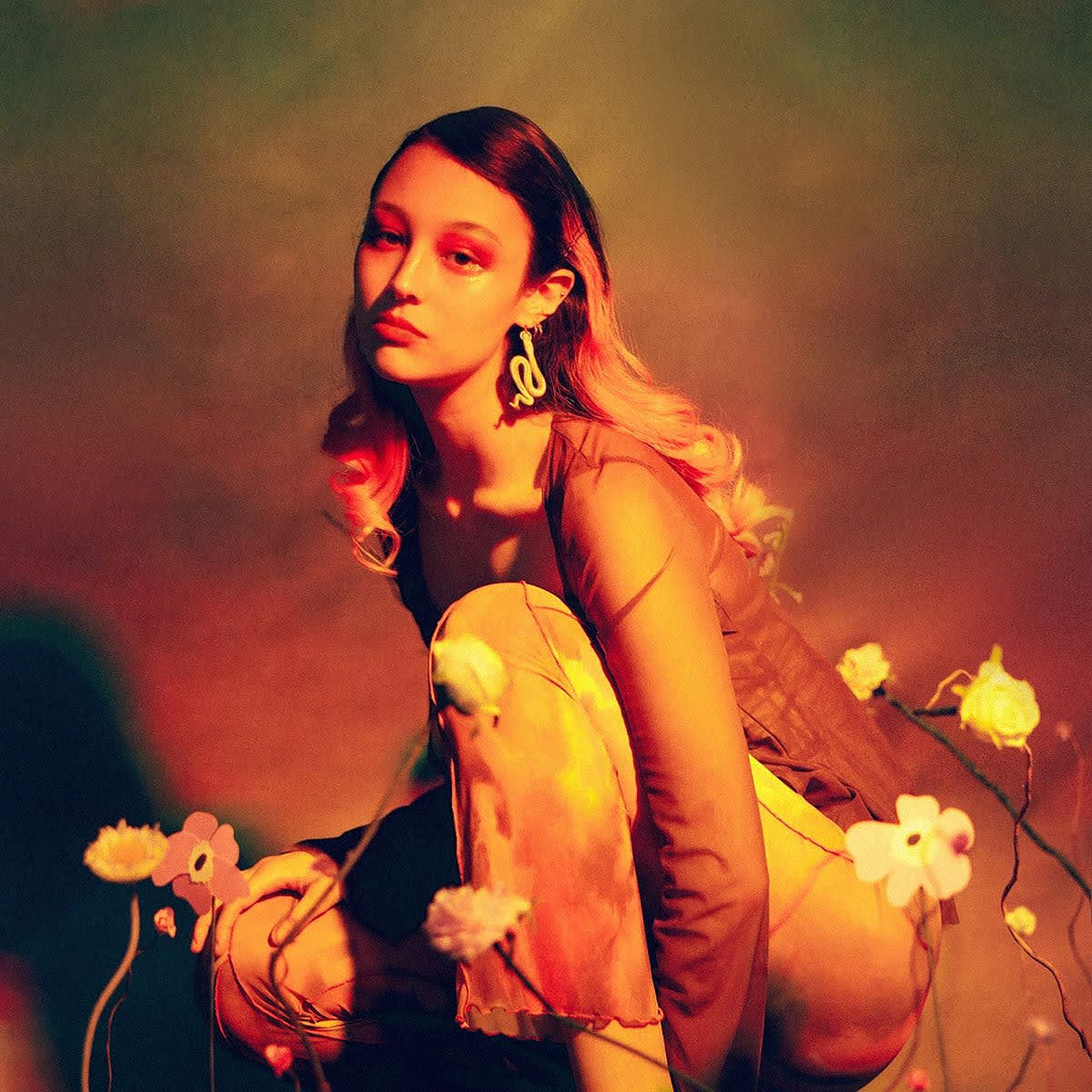
So obviously, we’ve got to touch on the fact that you opened for Japanese Breakfast last year, which is so cool. I remember, I think it was the premiere for “Alone But Not Lonely,” it was around the same time as when that [was announced]. And I remember being like, “Oh my God, this is sick. This is like a match made in music heaven.” So what did that experience teach you? And did you learn anything from Michelle? Because I know with COVID, you guys kind of didn’t get to interact that much, but I guess just even getting to watch Michelle or be around Michelle and the band, what did you [learn] from that whole experience?
It’s funny, every time someone brings up that I went on tour with Japanese Breakfast I just have to smile so big. I still can’t believe it. But Japanese Breakfast and Michelle specifically was such an inspiration for me starting out. And when I went to her show in Toronto in 2018, it was one of the first times I really felt represented by someone—she’s also half Korean, so it was like exactly that direct representation. And I felt kind of unexpectedly emotional at that show. And then getting the call to hear that they wanted me to come out for them was just so surreal. I was at the studio when I found out and I was screaming. But yeah, it was an incredible experience. It was my first long tour, [it was] six weeks. I’d never done anything like that before. Most of the cities I had also never been to in my life. It was really cool and all of Japanese Breakfast is so lovely. They’re all great people. And it was a great learning experience to just watch them and how they navigated the day-to-day of for life. There was so much to learn from that. And yeah, watching Michelle perform on stage every night was also really inspiring. First of all, as a fan, I was just so excited to be able to watch their set every night from backstage. Some people are like, “Oh, you didn’t watch it every night, right?” And I was backstage watching every night for 30 shows. She’s an incredible performer, so engaging and dynamic. And yeah, so just being able to observe all that was an amazing experience.
She’s so cool. I finished reading her book a couple of months ago last year, and I was like, Oh my God, I already thought she was a badass before all of this.
She’s so talented! It’s an amazing book.
I was going to be like, “Girl, have you read it?” Because I cried!
Yeah, she’s such a great writer. Like, she’s so open and vulnerable about everything. Also, she’s really funny, and it’s so well done.
It’s amazing. I feel like even if you’re a good songwriter, it doesn’t always necessarily translate to putting the pen to the page. But in her case? Amazing. OK, I’m trying to think there’s anything else I wanted to touch on that I haven’t yet because I feel like we sort of flew through most of it. We’ve got a few more minutes. I mean, I know this is kind of like the typical question, and you might not have an answer, but do you have a favourite song on the album or one that just means a lot to you?
I would say it’s changing all the time, but today my favourite song, the album, is probably “What You’re Thinking” because it’s the freshest. It was the last thing I added to the album before it got finalized. It was the most recent one that I wrote, and I had a much heavier hand in the production of that one than some of the other songs. And yeah, I just feel like I learned so much from making the jams, and I made the song after I made the jams, but I was able to take everything I learned about production and arrangement into this one. And I was really proud of how I was able to craft it together as a song.
Oh, that’s awesome. I mean, I know it’s very much sort of like picking a favourite child. And when I do interviews, everyone’s like, “Well, yeah, today it’s this, tomorrow it’s that one.” It’s all valid. I mean, at the end of the day, they’re all yours and you put so much work into them.
Also, maybe I’ll just quickly mention that I have my first headlining tour. It’s just wild because since it’s my first headline one, I’m just like, “Whoo!” It’s just hard to wrap my head around the fact that people in these cities that I’ve barely even been to are buying tickets to come see me specifically. So that’s like a really incredible feeling, and I think it’s going to be really special. I’m trying to like, enhance our show. As a headliner, you have a lot more creative freedom. So I think this time I’m going to be able to bring my harp; I’ve never really played that live in the show before. So I’m excited to bring the show to the next level.
That’s so exciting. Are you going to try to make all your family and friends go?
Yeah, most of my family and friends are in Toronto, but now that I'm in L.A. I have a lot of friends here too, so I'm like, “Everyone come!”

